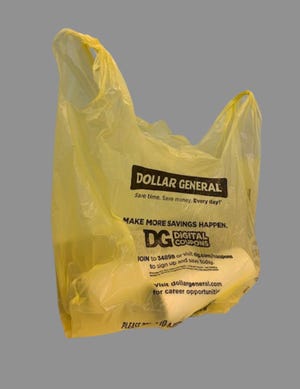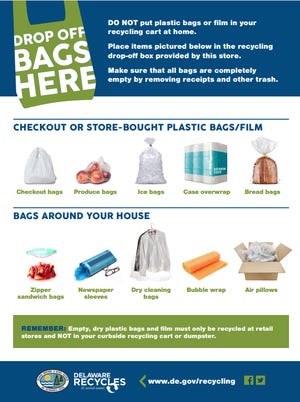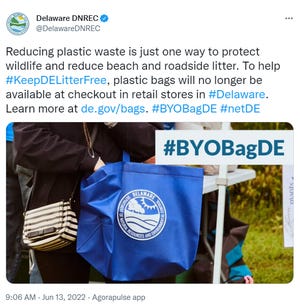If at first, you don’t succeed, try again – at least, that’s Delaware’s plan when it comes to banning plastic bags.
Beginning July 1, retail stores in Delaware will no longer be able to provide plastic carryout bags of any kind to shoppers.
This new mandate is a response to stores taking advantage of loopholes in the original Plastic Carryout Bag Ban that went into effect last year. The original ban allowed plastic bags with as much as a 2.25-millimeter-thickness to be considered reusable and made exceptions for businesses with smaller footprints.
The amended law now prohibits retailers of any size from distributing any plastic carryout bags. This time, the only exception is for restaurants, which are still allowed to provide single-use plastic carryout bags of any description and are not required to have an at At-Store Recycling program.
WHY NOW:Plastic bag ban: How Delaware is moving closer to tougher restrictions
Stores may provide reusable or paper bags at checkout, as well as sell reusable bags or offer no bags at all. Reusable bags are defined as carryout bags made of cloth, durable or washable fabric bags with stitched handles.
Why ban plastic carryout bags?
The ban is designed to reduce both negative health impacts on people and pollution of the environment. The law notes that most plastics are disposed of in landfills, are incinerated, or become litter in waterways and oceans. Single-use plastic bags contribute a toll on human health and well-being, too, as toxic plastic particles are now found in the food chain.

According to the legislation, plastic carryout bags are especially difficult to recycle and can add to recycling costs when they contaminate other material that is being processed for recycling or clog the machinery in recycling facilities.
The Delaware Department of Natural Resources and Environmental Control published a FAQ about the ban addressing retailers, as well as a separate one for consumers.
The consumer FAQ explains that each Delawarean uses about 434 plastic bags a year, amounting to nearly 2,400 tons of plastic bags that end up in landfills every year.
The hope is that by decreasing the number of plastic carryout bags the public uses, via the ban, a large portion of plastic waste will be reduced.
Exceptions to the ban
The new law still does not ban all types of plastic. Plastic bags typically used in stores for produce and other items are still allowed to be given out.

However, any retailer that provides an exempt bag is required to set up an At Store Recycling area and it must be easily accessible to customers. The exempt plastic bags include:
- Bags used to contain or wrap food items, such as meat, fish, or coffee
- Produce bags used to contain fruits, nuts, vegetables or candies
- Dry cleaning bags
- Bags used to contain live animals such as fish or insects sold in pet stores
- Bags used to transport pesticides, drain-cleaning chemicals or other caustic chemicals
- Plastic bags with no handles used to protect a purchased item such as flowers or potted plants
- Plastic used to contain dampness or prevent damage or contamination when placed in a recycled paper bag or a reusable grocery bag with other purchased items
Keep forgetting your bag?
If you can’t remember to bring your reusable bags in the car or at home, here are some suggestions provided by DNREC:
- First item on your shopping list: “Remember BAGS!”
- When leaving home, sing the song “Head, Shoulders, Knees & Toes,” substituting the words: “BAGS, Wallet, Keys & Phone.”
- Hang your reusable bags at your front door
- Keep a box/laundry basket in the trunk to hold items
- Use a carabiner to clip your bags together and then clip them to your shopping cart at the store
- If purchasing just a few items, skip the bag altogether
One more suggestion from DNREC for those who may have too many reusable bags –give away your extras.
They recommend gifting one to a neighbor, a person in line at the store, or using it as a gift bag itself, making for two gifts in one.

To promote awareness of the ban, DNREC is using social media and created the hashtag #BYOBagDE (Bring Your Own Bag Delaware).
For more information, visit de.gov/bags for all the details.
You can contact reporter Anitra Johnson at ajohnson@delawareonline.com. To get unlimited access to all of her reporting and the latest news please subscribe.